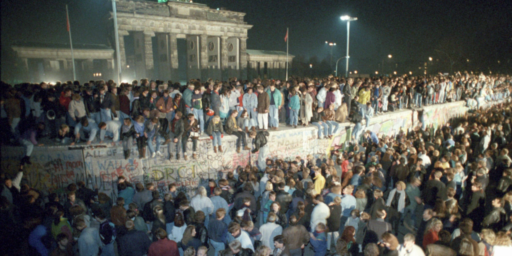1989 REDUX
Daniel Henninger believes that the ouster of Saddam will bring changes to the Middle East comparable to those the fall of the Berlin Wall brought to Eastern Europe.
In 1989, mere months before he was to become the president of Czechoslovakia, Vaclav Havel was in prison. Lech Walesa that year, attempting to form a coalition government in Poland (after 10 years of effort by Solidarity), conceded the defense and interior ministries to the communists. In 1990, after Romania’s freest election in 40 years, prominent newspaper editor Florica Ichim was hiding for her life in a Bucharest apartment, pursued by members of Ceausescu’s old Securitate police, who with the newly elected government’s assent smashed the offices of opposition parties. New, freer media will soon appear in Iraq, and it too will come under pressure from old political factions.
On Wednesday, a commentator for Al Jazeera said prophetically, “It is an earthquake, not just for Iraq but for the whole region.” The only things we should predict now for the Middle East are events no one can foresee. We can’t possibly predict which personalities may emerge to gain the assent and support of the Iraqi people. We know the names Chalabi, Talabani and Barzani. We don’t yet know who may have emerged this week from Saddam’s dungeons.
When in 1989 Hungary eased its police-state restrictions on border passage, and 10,000 East Germans flooded into Hungary, we editorialized on this page: “It is no longer appropriate to speak simply of ‘Eastern Europe’. That monolithic phrase described an artificial political geography of sputtering economies, false politics and sad people.” That seemed an apt description of the Middle East as well–before someone took a hammer to Saddam’s statue.
Perhaps the heavy sands of Araby will smother this achievement in time. But some of us recall having no expectation of seeing the Berlin Wall fall in our lifetime. Why is it not as possible that 14 years after this particular liberation, we will look differently at the adjoining governments–and economies–of Iran, Syria and Saudi Arabia?
Hungary, incidentally, came under great counter-pressure back then from the still-communist governments of East Germany, Czechoslovakia and Romania; Iraq likely will as well, including sabotage and violence, such as the mob murder of two clerics in Najaf yesterday. The politics of East Europe were beset for years by thugs who formerly belonged to the secret police; Iraq’s fedayeen may do the same. Its striving democrats will need support, rather than carping, from the new coalition of democratic nations.
Of course, the fall of the Berlin Wall also was followed rapidly by the implosion of the Soviet Union and the resultant sea change in international relations. It therefore strikes me as unlikely that 1989 and 2003 are comparable. This is a good start but, in and of itself, isn’t going to lead to a total reordering of the Arab world unless followed by a dramatic shift in the US foreign policy of the last several decades.




